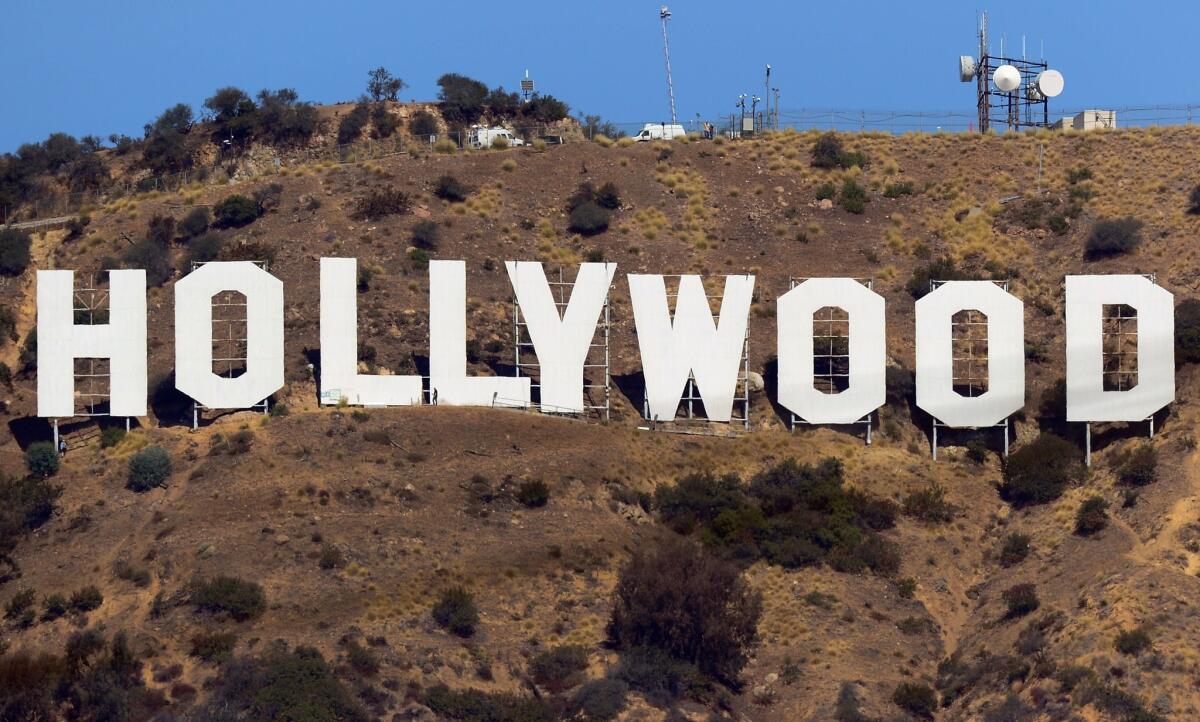The Hollywood sign is a public treasure, and no one should have to pay to use its image

- Share via
The Hollywood sign is a beloved Southern California landmark. Built in 1923 and donated to the City of Los Angeles in 1944, it sits on public land atop Mt. Lee in Griffith Park.
The sign truly belongs to the public. And yet, in a sleight of hand, the Hollywood Chamber of Commerce insists that it owns trademark rights to the sign’s “likeness” and therefore can charge for the use of that image.
For years, lawyers for the chamber have been threatening to sue over the use of the Hollywood sign in a variety of projects, from a student film and UCLA law school recruitment brochure to an advertising campaign and tourist photo. British YouTuber Tom Scott mocked the chamber’s trademark bullying by bleeping out the word “Hollywood Sign” and pixelating the sign as if it were some X-rated porn star in his video about the sign.
The chamber, which has had control of licensing trademarks for the sign since at least 1992, claims it has “certain trademark rights for usage of the Sign or its likeness for commercial purposes.” But what most people don’t realize is that the chamber tried and failed to register trademarks on the Hollywood sign with two applications to the U.S. Patent and Trademark Office in 2004.
The trademark office rejected the applications because you can’t get trademark protection for the the name of a place. The Hollywood sign may be a landmark, but it is also the name of a place. Trademarks are only granted for geographic names in association with specific products and services. The only way that the chamber could have won a trademark for the Hollywood sign is if it had showed that the public widely associated the sign with a specific product. That’s what the owners of Arrowhead Water or California Pizza Kitchen did.
Before the chamber could appeal the trademark office’s rejection, the big Hollywood studios — Paramount Pictures, CBS Broadcasting, 20th Century Fox, Columbia Pictures and Universal City Studios — went ballistic because the chamber’s applications sought a trademark for the sign as a stage prop. The studios feared that the chamber would demand licensing fees to show the sign in movies and TV shows, according to studio sources. After the studios filed papers with the U.S. Patent and Trademark Office seeking more time to file comments, the chamber abandoned its applications.
The chamber, however, was not dissuaded from pushing its right to trademark the word “Hollywood.” It sought and obtained federal trademarks for the word, using the sign’s blocky all-caps, staggered lettering.
This time, the chamber followed the requirements for applying for a trademark for a geographical location. It argued that the word “HOLLYWOOD” had become known to the public as the brand name for candy, food, jewelry, clothing, athletic apparel, paper, “licensing of intellectual property,” and “advertising services” after five years of continuous use in the marketplace. The trademark office granted these dubious trademarks.
Those registrations do not apply to an image of the sign itself. But that hasn’t stopped the chamber from demanding that filmmakers, television producers and other artists pay licensing fees to show the sign in their works. There is no need to pay. As one scholar explained, these creative works don’t violate trademark laws when they simply show the Hollywood sign to signify that “the scene took place in Hollywood.” That’s called descriptive fair use.
There’s also the First Amendment. The constitutional right to free expression gives the creators of films, television shows, video games, and YouTube videos the right to show the Hollywood sign for artistic reasons or realism without paying a dime. But even when people are within their legal rights to use the image, they pony up when they get a cease-and-desist letter from the chamber demanding money because it’s cheaper than a lawsuit.
Many courts have reaffirmed a First Amendment protection for expressive works. The most recent decision came down on March 31 from a federal judge in New York. The judge dismissed a trademark lawsuit brought by the maker of Humvees against Activision, the publisher of the “Call of Duty” video games. He ruled that Activision has a First Amendment right to show the trademarked Humvees, which provide a dose of “realism” in depicting contemporary warfare.
The Hollywood sign is a historical, geographical and cultural touchstone for Los Angeles. It’s not just a billboard for Hollywood. It’s an icon that has come to represent dreams made here in California. You shouldn’t have to pay a licensing fee for that.
Susan E. Seager is a staff attorney at the UC Irvine Law School Intellectual Property, Arts, and Technology Clinic and Sachli Balazadeh-Nayeri is a law student working in the clinic.
More to Read
A cure for the common opinion
Get thought-provoking perspectives with our weekly newsletter.
You may occasionally receive promotional content from the Los Angeles Times.









